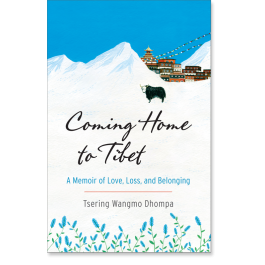Trauma
Coming Home to Tibet: Author Tsering Wangmo Dhompa
An interview with author Tsering Wangmo Dhompa about her book about Tibet
Posted July 11, 2016

Tsering Wangmo Dhompa was the first Tibetan female poet to be published in English. Raised in India and Nepal, she came to the U.S. for graduate school at UMass, Dartmouth, has an MFA from San Francisco State University, and is now pursuing a Ph.D. in Literature at UC Santa Cruz. She has published five books of poetry, including one that was a finalist for the Asian American Literary Awards. She’s been published in numerous journals, including Poetry Foundation. Her nonfiction debut, Coming Home to Tibet: A Memoir of Love, Loss and Belonging, was just published by Shambhala. Details about the author's readings are at the end of the post.
Ravi: Congratulations on the publication of your book. I fell in love with the book in the Penguin-India edition, and am so glad that a U.S. publisher saw the light! Thanks for being willing to answer a few questions.
When you were in the process of writing Coming Home to Tibet, you told me you wanted to give readers an experience of the land and people of Tibet. Tell us more about the genesis of the book.
Tsering: I spent a lot of time as a child with my mother and her relatives/friends who were all from nomadic communities in Nangchen, Eastern Tibet. They narrated stories about their nomadic lands and the life, environment, philosophy and concerns that shaped their lives. Many of my Tibetan friends in exile have never been to Tibet and I wanted them to get to know Kham a little bit, to understand the diversity within Tibet.
There's an event from my youth that remains with me and that I thought about a great deal while writing the book. I must have been about 14-years old when two Americans asked to interview my mother. I think they wanted to adapt her story for a book or a film project. They taped conversations with her for many hours and returned the second day to continue the project. I was sitting in one corner of the room, listening to the exchanges. On the second day my mother said she was not willing to proceed with the project any further. They cajoled her with promises of good things to come. I heard my mother tell them that they did not understand the full extent of her story. She said, "My daughter will tell my story." I was deeply moved when I heard that even though at that time I had no real idea about representation, voice, trauma or the kind of ideas I have learned about since. My mother had lived through a lot and she was speaking from a place of great wisdom and recognition of the importance of being able to speak instead of being spoken for.
Ravi: I starred these lines:
“I have lived my life defined as a refugee in Nepal and India, a resident alien and immigrant in the United States. At last, I am a Tibetan in Tibet, a Khampa in Kham, albeit as a tourist in my occupied and tethered country.”
Your book is poignant with loss, change, but also resilience. What would you like people to take away from your writing about the land, politics and people of Tibet? What did you take away from your experiences there?
Tsering: I think many people continue to view Tibet as an idea, or as a mythical space because conversations about the politics of contemporary Tibet often turn into discussions on Buddhism, and Tibet's "beautiful" past. I want to encourage people to think about the present. Doing so includes listening to the narratives, the songs, the everyday achievements and struggles of Tibetans who live under Chinese occupation and surveillance every single day. The past is important but it is the present that I would like readers to think about.
Ravi: Later, you write:
“(They believe) the loss (of their country) was due to their karma and so the Chinese are part of that karma. It is hard to fight with such beliefs. This too is the history of the Tibetan people. Acceptance and fate explain everything while memory, our illusionary accomplice, hobbles at our side like a shadow.”
You explore this challenge eloquently. I admired the power of religious belief to allow those in your book to make peace with the great traumas and difficulties of their lives and history. On the one hand, I wish that all traumatized people could regenerate their own personal and communal goodness and vitality by letting go of dark inner narratives. But on the other hand, as human beings, we long for all wrongs to be righted. For the Tibetan people, I would think that would mean that all the conditions for their culture should thrive. As a conveyor for this conflict, of letting go and accepting, versus struggling, where do you stand?

Tsering: I have great admiration for the generation of Tibetans who suffered so much and who manage still to live the language of acceptance and forgiveness. Maybe such an attitude comes from the solidarities that are built with people who have shared and experienced the traumatic losses together. Maybe it comes from Buddhist beliefs. Almost all Tibetans shared the experience of national and personal dislocation and trauma. I came after the upheaval, I inherited the losses, so to speak, but never went through the suffering as those of my mother's generation did. I will never be able to speak for my mother's loss or understand the full intensity and meaning of what she went through. I cannot accept, as many Tibetan elders do, that their suffering and losses are a consequence of fate, individual or collective. It does not begin to address questions of responsibility, ethics, history and justice for me. It's important for me to believe in justice. I think it's crucial that Tibetans living inside Tibet be treated as human beings. They must be given the right to express and exercise their desires/hopes whatever those might be—freedom from Chinese rule, freedom to practice their religious faith or freedom to choose—and we need to listen to them.
Ravi: Another favorite line was:
“We are alienated from our own past and from the future of the countries we live in. Where we are is the best we can hope for. We learn to be grateful.”
Your title speaks of “A Home”, but much of your book speaks to feelings of longing, displacement and disempowerment. Your book is so meaningful for those interested in and affected by the Tibetan diaspora, but I think for so many people who feel lost or displaced in the world. There are so many people—fully 1% of the world’s population—who became displaced in 2015 alone. And so many people feel an eroded sense of belonging and connection, particularly in these politically polarized times. What does “home” mean for you? Did it take on a new meaning after your voyages and writing?
Tsering: You are so right, this feeling of displacement is a state that is increasingly common to many people in this era of so many movements whether we're discussing flexible borders for those who are citizens or those who are forced to flee their countries. I do think however, that we need to pay attention to people without citizenship and representation because for them the force of history and violence is tremendous. I lived as a "refugee" for years as a child and the insecurity and instability I continue to feel (I am a US citizen now) makes no sense but it's real for me. The meaning of home changes and I'm not sure where it really is anymore. I think it's where I am in the present. Maybe home is something I am aspiring towards, something that will always remain unresolved.
Ravi: In the face of that, it's so important, I think, that we make home for each other, in some way.
One of my favorite chapters in the book was about the Tibetan mastiffs, which are highly valued in mainland China. Your writing was gripping and humorous; I felt I was reading a New Yorker essay!
Tsering: Oh, I am so glad to hear you enjoyed that chapter. Thank you for saying so. I had a great time writing it. I thought about my friends, one in particular (Judy) who loves dogs and I wrote it with her in mind. I had fun.
Ravi: You end your book after the 2010 earthquake, the year after your visit. You tell us that the Chinese Consulate has, for reasons they will not state, repeatedly denied you a visa to return to Tibet. You close with eloquent questions:
“How do we read the silence framing the self-immolations and in what language and register must we learn to respond? Are we listening to the aspirations of Tibetans inside Tibet to guide policies towards a future for all Tibetans?”
The world’s story is one of power and powerlessness. Here, you very clearly call attention to the children of that duality: “silence” and apathy vs. “listening”. What messages would you like the powerful and disempowered to hear?
Tsering: I feel I am still learning to listen and to formulate what and how we need to speak. I suppose this means we must first create open spaces where we can. A gesture that opens ourselves up.
Ravi: Thank you for your beautiful and important work. May it guide us all to greater understanding and compassionate action.
Tsering: Thank you so much, Ravi.
UPCOMING BOOK EVENTS
Sunday, July 17, 5pm
Green Arcade Bookstore
1680 Market Street @Gough
San Francisco CA 94102
Wednesday, August 3, 2016 - 7:00pm
Books Inc.
1491 Shattuck Ave
Berkeley, CA
Wednesday, August 17, 2016 - 6:30 pm
Rubin Museum
150 W. 17th St.
New York, NY
Event Details and tickets
Check back for dates in NYC and Toronto.
(c) 2016, Ravi Chandra, M.D. F.A.P.A.
Occasional Newsletter to find out about my book-in-progress on the psychology of social networks through a Buddhist lens, Facebuddha: Transcendence in the Age of Social Networks: www.RaviChandraMD.com
Private Practice: www.sfpsychiatry.com
Twitter: @going2peace
Facebook: Sangha Francisco-The Pacific Heart
For info on books and books in progress, see here and www.RaviChandraMD.com




